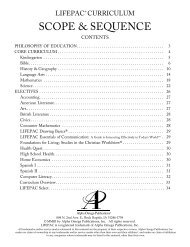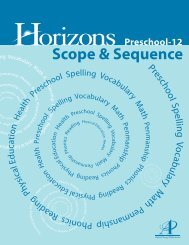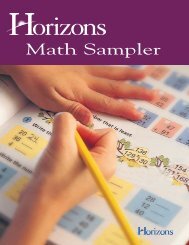spanish 1 - Odyssey Academy
spanish 1 - Odyssey Academy
spanish 1 - Odyssey Academy
Create successful ePaper yourself
Turn your PDF publications into a flip-book with our unique Google optimized e-Paper software.
SPANISH 1<br />
LIFEPAC EIGHT<br />
CONTENTS<br />
I. VOCABULARY & GRAMMAR........................................1<br />
II.<br />
TRANSPORTATION VERB: VIAJAR...............................5<br />
III. THE PRESENT PROGRESSIVE ....................................12<br />
IV. VACATIONS AND RECREATION ................................19<br />
V. GRAMMAR: DIRECT OBJECT PRONOUNS.................29<br />
VI. GEOGRAPHY OF SPAIN ..............................................39<br />
VII.<br />
VIII.<br />
REVIEW EXERCISES....................................................43<br />
VOCABULARY DRILL...................................................47<br />
VOCABULARY LIST.....................................................52<br />
Authors:<br />
Editor:<br />
Graphic Design:<br />
Katherine Engle, B.A., M.A.<br />
Vicki Seeley Milunich, B.A., M.S. Ed.<br />
Alan Christopherson, M.S.<br />
Christine E. Wilson, B.A., M.A.<br />
Kyle Bennett, Jennifer Davis,<br />
Alpha Omega Staff<br />
804 N. 2nd Ave. E., Rock Rapids, IA 51246-1759<br />
© MCMXCIX by Alpha Omega Publications, Inc. All rights reserved.<br />
LIFEPAC is a registered trademark of Alpha Omega Publications, Inc.<br />
All trademarks and/or service marks referenced in this material are the property of their respective owners. Alpha Omega Publications, Inc.<br />
makes no claim of ownership to any trademarks and/or service marks other than their own and their affiliates’, and makes no claim of affiliation<br />
to any companies whose trademarks may be listed in this material, other than their own.
SPANISH 1: LIFEPAC 8<br />
TRAVEL & TRANSPORTATION<br />
OBJECTIVES<br />
When you have completed this LIFEPAC, you should be able to:<br />
1. Discuss transportation needs, including destinations and modes of transport.<br />
2. Use the forms of estar to communicate the location of yourself, buildings, etc.<br />
3. Choose between the simple present and the present progressive tenses in<br />
conversation and recognize the use of these tenses while reading and listening to<br />
other speakers.<br />
4. Become increasingly proficient in the use of direct object pronouns.<br />
5. Use the reflexive verbs and pronouns in order to discuss your own personal care<br />
and hygiene.<br />
I. VOCABULARY & GRAMMAR<br />
Conversation<br />
Listen and repeat this conversation.<br />
Manuela is talking with her friend Daniela about traveling.<br />
Manuela:<br />
Daniela:<br />
Manuela:<br />
Daniela:<br />
Manuela:<br />
Daniela:<br />
Manuela:<br />
Daniela:<br />
Manuela:<br />
Daniela:<br />
Manuela:<br />
Daniela:<br />
Manuela:<br />
Daniela:<br />
Manuela:<br />
Daniela:<br />
¡Cuánto me gusta visitar a mi abuela!<br />
A mí también. ¿Vive ella lejos de aquí?<br />
Sí, está muy lejos. Estoy decidiendo como viajar a su casa.<br />
Es muy divertido viajar por bicicleta.<br />
No me interesa. La abuelita vive unos doscientos<br />
kilómetros de mi casa.*<br />
Por eso ni puedes tomar el metro ni puedes caminar. ¿Tienes un coche?*<br />
No tengo permiso de conducir. No puedo conducir una moto tampoco.<br />
Y viajar por avión cuesta mucho dinero. No es práctico.*<br />
Siempre me gustaría viajar por un barco, ¿sabes?<br />
¡Creo que no es necesario esta vez!<br />
Bién, solamente me quedan el autobús y el tren.*<br />
Yo prefiero el tren. Los trenes son limpios y más rápidos.<br />
Sí, sí, sí… Voy a comprar un billete para el sábado por la noche, para llegar a<br />
su casa el domingo por la mañana.*<br />
¡Y tu abuelita puede encontrarse contigo en la estación!<br />
¡Qué plan más fantástico! Muchas gracias por la ayuda, Dani.<br />
No es nada. Quizás algún día viaje contigo.<br />
*This corrected portion of the conversation will not agree with the audio CD.<br />
1
Translation<br />
Manuela:<br />
Daniela:<br />
Manuela:<br />
Daniela:<br />
Manuela:<br />
Daniela:<br />
Manuela:<br />
Daniela:<br />
Manuela:<br />
Daniela:<br />
Manuela:<br />
Daniela:<br />
Manuela:<br />
Daniela:<br />
Manuela:<br />
Daniela:<br />
I like to travel to my grandmother’s house so much!<br />
I do too. Does she live far from here?<br />
Yes, she is very far. I have to decide how to travel to her house.<br />
Traveling by bike is a lot of fun.<br />
I’m not interested in that. Grandma lives about 200 kilometers from my house.<br />
Therefore, you can’t use the subway, nor walk. Do you have a car?<br />
I don’t have a driver’s license. I can’t drive a motorcycle either.<br />
And to travel by airplane costs a lot of money. It’s not practical.<br />
I’ve always wanted to travel by ship, you know!<br />
I don’t think that’s necessary this time!<br />
Well, I’m only left with the bus and the train.<br />
I prefer the train. Trains are clean and faster.<br />
Yes, yes, yes… I’m going to buy a ticket for Saturday night and arrive at her<br />
house Sunday morning!<br />
And your grandma can meet you at the station!<br />
What a fantastic plan! Thanks for the help, Dani.<br />
It’s nothing! Maybe someday I will travel with you.<br />
Using the translation as a guide, locate and record the following Spanish expressions:<br />
1.1 a. far from _________________________________________________<br />
b. I’m interested _________________________________________________<br />
c. to walk _________________________________________________<br />
d. a driver’s license _________________________________________________<br />
e. it costs _________________________________________________<br />
f. I would like _________________________________________________<br />
g. by _________________________________________________<br />
h. trains _________________________________________________<br />
i. a ticket _________________________________________________<br />
j. the station _________________________________________________<br />
2
Practice this dialogue with your learning partner several times.<br />
1.2 Make sure to pay special attention to the correct vowel sounds and where the accents are,<br />
then share the conversation with a teacher or parent.<br />
✔<br />
Adult check ___________________________________________________________________<br />
Initial<br />
Date<br />
The Verb Forms Estar – to be<br />
The verb estar (to be) is considered irrregular and must be memorized along with the accents:<br />
yo estoy nosotros estamos<br />
tu estás vosotros estáis<br />
él está ellos están<br />
ella está ellas están<br />
Ud. está Uds. están<br />
If estar translates “to be,” then the yo form is “I am.” How do the other forms translate?<br />
1.3 a. tú estás ______________________________________________________________<br />
b. el está ______________________________________________________________<br />
c. ella está ______________________________________________________________<br />
d. Ud. está ______________________________________________________________<br />
e. nosotros estamos__________________________________________________<br />
f. ellos están ______________________________________________________________<br />
g. Ellas están ______________________________________________________________<br />
h. Uds. están ______________________________________________________________<br />
3
SELF TEST 1<br />
1.01 Fill in the blank with the correct forms of estar (to be). (10 pts. each)<br />
a. Mi familia _____________________ en Nueva York.<br />
b. Yo _____________________ en casa.<br />
c. Marcos _____________________ viajando por avión.<br />
d. Ustedes _____________________ caminando al parque.<br />
e. Tú y yo _____________________ contentos.<br />
f. La clase _____________________ hablando demasiado.<br />
g. Elena y su amiga _____________________ viajando en tren.<br />
h. Pedro y Alonso _____________________ en el bote.<br />
i. La profesora _____________________ delante de a la clase.<br />
j. Usted _____________________ comprando un billete.<br />
80<br />
100<br />
Score _________________<br />
Teacher check<br />
_________________________________<br />
Initial<br />
Date<br />
4








